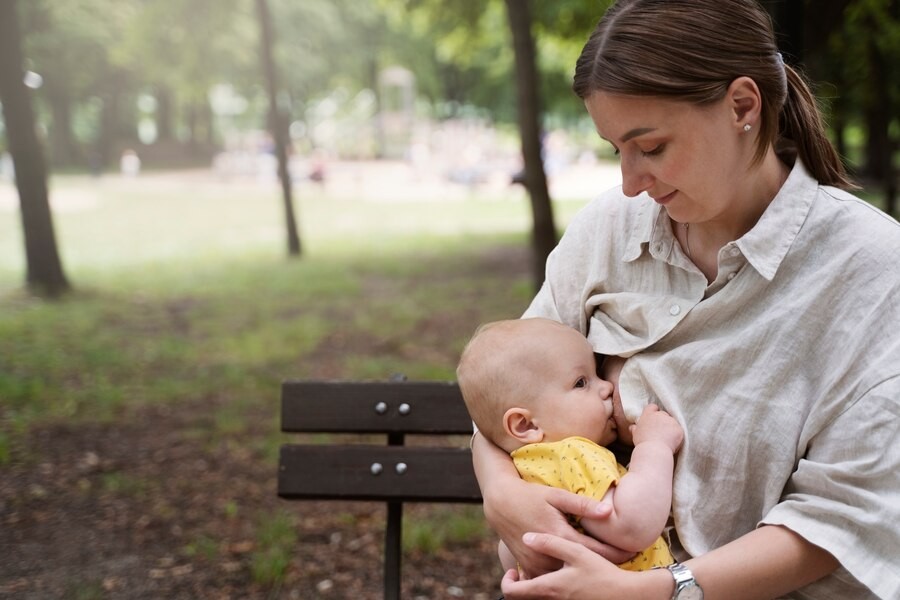Menyusui bukan hanya memberi manfaat bagi tumbuh kembang si kecil namun juga bermanfaat bagi ibu. Bagi ibu, menyusui adalah kegiatan membakar kalori yang dapat membantu mengembalikan berat badan ibu ke ukuran semula dan menurunkan risiko penyakit kronis seperti diabetes tipe 2 serta beberapa jenis kanker.
Berapa Kalori yang Terbakar saat Menyusui?
Menyusui adalah kegiatan yang membutuhkan banyak energi. Kalori yang dibakar saat menyusui tergantung dari banyak faktor seperti usia bayi, frekuensi menyusui, berapa banyak air susu ibu (ASI) yang dihasilkan ibu dan kalori yang terdapat dalam ASI. Namun secara umum, ibu yang menyusui secara langsung dapat membakar kalori hingga sebanyak 500-700 kalori per hari. Sementara itu ibu yang tidak menyusui secara penuh bisa membakar kalori 250-400 per hari.
Dari banyaknya kalori yang terbakar saat menyusui, hal ini dapat membantu ibu menurunkan berat badan. Sebuah penelitian di tahun 2014 menunjukkan bahwa ibu yang menyusui langsung selama 3 bulan mengalami penurunan berat badan sekitar 1-2 kilo jika dibandingkan dengan ibu yang tidak menyusui secara langsung. Ibu yang menyusui langsung juga dianggap lebih cepat kembali ke berat badan semula sebelum menyusui dibandingkan dengan ibu yang tidak menyusui.
Namun para ahli mengingatkan bahwa menyusui sebaiknya tidak dianggap sebagai mekanisme menurunkan berat badan semata. Mengingat menyusui merupakan kegiatan yang membutuhkan kalori cukup banyak, para ibu dianjurkan makan makanan sehat untuk memenuhi kebutuhan kalori harian. Jika seorang wanita biasanya mengnsumsi 2000 kalori per hari maka ketika menyusui kebutuhan kalorinya dapat meningkat hingga 2500-2700 kalori per hari.
Baca Juga: Cara Menyusui Bayi Prematur
Makanan yang Sebaiknya Dikonsumsi saat Menyusui
Selama menyusui, Anda perlu menjaga kesehatan dan pola makan untuk memastikan si kecil mendapatkan semua nutrisi yang dibutuhkan untuk berkembang. Proses produksi ASI juga membutuhkan banyak kalori tambahan dan nutrisi sehingga ibu menyusui dianjurkan mengonsumsi makanan dengan gizi seimbang.
Untuk memenuhi kebutuhan nutrisi selama menyusui, ibu perlu mengonsumsi nutrisi yang bervariasi, di antaranya:
- Protein
- Vitamin D
- Vitamin A
- Vitamin E
- Vitamin C
- Vitamin B12
- Selenium
- Zinc
Baca Juga: Panduan Memilih Obat Pilek untuk Ibu Menyusui
Beberapa pilihan makanan bergizi yang bisa Anda konsumsi saat menyusui, antara lain:
- Ikan dan makanan laut (rendah merkuri) seperti salmon, rumput laut, kerang
- Daging merah dan unggas seperti ayam, sapi, domba, kambing, jeroan
- Buah-buahan dan sayuran seperti kelompok buah beri, tomat, paprika, kubis, kangkung, bawang putih, brokoli
- Kacang-kacangan dan biji-bijian seperti almond, kenari, biji chia, flaxseed
- Lemak sehat seperti alpukat, minyak zaitun, kelapa, telur, yogurt tinggi lemak
- Pati kaya serat seperti kentang, ubi jalar, kacang-kacangan, lentil, oat, quinoa, soba
Mengonsumsi makanan sehat dengan bahan alami dan minim olahan dapat memenuhi kebutuhan nutrisi harian ibu menyusui. Namun jika ibu menyusui mengalami kekurangan salah satu atau beberapa nutrisi, bisa mengonsumsi suplemen sesuai kebutuhan. Sebelum mengonsumsi suplemen nutrisi, sebaiknya konsultasikan mengenai kebutuhan nutrisi dan cara pemenuhannya dengan dokter atau ahli gizi.
Jika Anda memiliki pertanyaan seputar menyusui, Anda juga bisa memanfaatkan fitur konsultasi yang tersedia pada aplikasi Ai Care yang bisa diunduh di ponsel.
Mau tahu informasi seputar kehamilan, menyusui, kesehatan wanita dan anak-anak? Cek di sini, ya!
- dr. Monica Salim
Scaccia, A. (2019). How Many Calories Does Breastfeeding Burn?. Available from: https://www.healthline.com/health/parenting/breast-feeding-calories
CDC: Maternal Diet. Available from: https://www.cdc.gov/breastfeeding-special-circumstances/hcp/diet-micronutrients/maternal-diet.html?CDC_AAref_Val=https://www.cdc.gov/breastfeeding/breastfeeding-special-circumstances/diet-and-micronutrients/maternal-diet.html
Kubala, J., and Bjarnadottir, A. (2024). Breastfeeding Diet 101: What to Eat While Breastfeeding. Available from: https://www.healthline.com/nutrition/breastfeeding-diet-101
Frost, A. (2022). Tips for a healthy breastfeeding diet. Available from: https://www.babycenter.com/baby/breastfeeding/diet-for-a-healthy-breastfeeding-mom_3565











